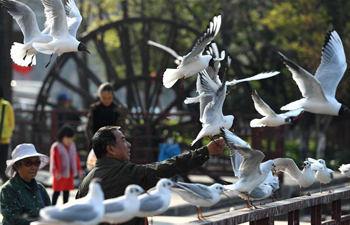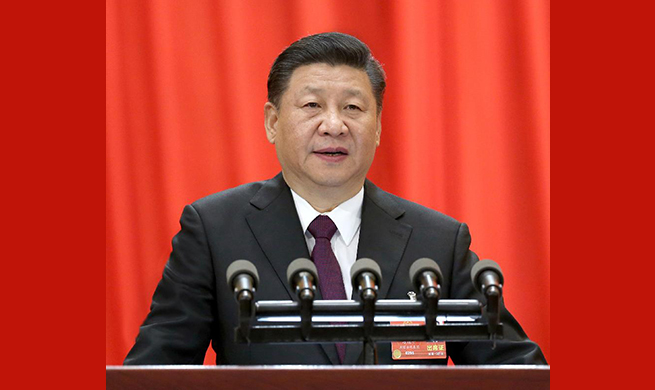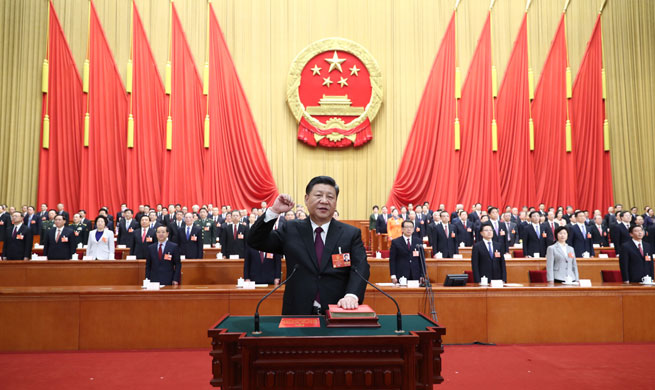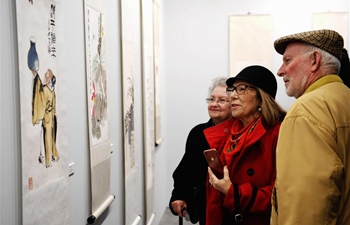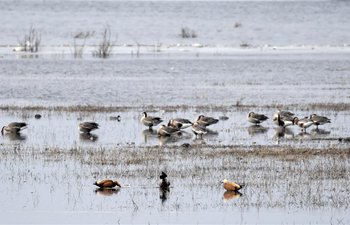ANKARA, March 22 (Xinhua) -- Turkish president and EU's senior officials will convene on March 26 in the current EU presidency Bulgaria's resort city of Varna in a bid to resume dialogue between Ankara and Brussels.
Turkish President Recep Tayyip Erdogan, with a large delegation of ministers, will meet Donald Tusk, President of the European Council, Jean-Claude Juncker, President of the European Commission, and Boyko Borisov, Prime Minister of Bulgaria.
"This will be a good opportunity to jointly assess matters of mutual interest and recent developments in your country, including in the area of rule of law and fundamental freedoms, which remain fundamental to the fabric of and prospects for EU-Turkey relations, as well as regional and international issues," read an invitation letter from Tusk to Erdogan.
The meeting comes after Turkey's recent attempts to defuse tensions with some European countries, primarily Germany, and to improve strained and stalled relations with Brussels after a deep crisis erupted mainly over the Turkish government's crackdown after the failed coup attempt on July 15, 2016.
Relations further deteriorated after a constitutional referendum that strengthened President Erdogan's powers in April 2017.
The latest meeting between the two sides in this format took place in May 2017 and both decided to revive regular meetings on cooperation areas. Yet, Ankara and Brussels continued ups and downs, and direct communication mechanisms could not produce a real advance in bilateral ties.
Turkey does not expect smooth ties with the EU on every issue, but wants progress that two sides can cooperate in mutual interests, according to Foreign Minister Mevlut Cavusoglu.
"It will be too much optimistic that one says we can normalize all issues with regards to relations with the EU. But, there are issues that we can take joint steps," Cavusoglu told Anadolu Agency on Thursday.
In this context, he touched upon the issues of visa liberalization and upgrading customs union agreement with the bloc.
"We are proceeding on the visa liberalization process. We have given our proposals. The issue may come up during the summit," he said referring to the Varna meeting.
Cavusoglu also elaborated requirements of a March 2016 deal with the EU to curb refugee influx into Europe.
Following refugee flow to Europe, the bloc's leaders signed a deal with Ankara promising to give 6 billion euros for helping Syrian refugees in Turkey, in return for sending back migrants crossing from the Aegean Sea into Europe.
The bloc promised to restart Turkey's EU membership talks and allow visa-free travel for Turkish citizens, a promise stipulated Turkey to meet 72 conditions necessary for this.
Turkey promised to make changes in the wording of definition of terrorism in the counterterrorism law following repeated calls by the EU for complying with European democratic and judicial standards.
But, Ankara delayed the move for over one and a half years till early 2018 on the argument of ongoing struggle against various terrorist groups.
In February, Turkish government made an attempt to launch the visa liberalization dialogue with the EU and submitted its position paper regarding its roadmap for the fulfillment of the remaining seven benchmarks of 72 criteria for visa-free travel of Turkish citizens in Schengen area.
EU in return will give its assessment for the position paper, but not submit it before the Varna meeting, "not to cast shadow on the summit," an EU official told Xinhua on condition of anonymity.
Ankara's customs union agreement with the EU came into force in 1995. Both Turkey and the EU seek to expand the scope of the agreement, which would have positive effects on trade relations in various industries.
Upgrading the agreement constitutes another topic of the meeting as Ankara wants to launch the process, which is likely to last at least in a couple of years.
However, Turkey's tense relations with Germany crippled the process last year. But Ankara and Berlin are in rapprochement since early 2018 which brings hope to pave the way for the process.
In Varna, EU officials cannot promise to launch talks to revamp customs union agreements because neither Tusk nor Junker has the authority to give promises on behalf of 28 members of the bloc, since there is not yet a consensus among them for the launch of technical talks, the EU official said.
For the EU side, there will be a positive step that Brussels may announce the second part of the EU's 6-billion-euro financial assistance for Syrian refugees in Turkey.
Unlikely to see a breakthrough, the upcoming summit will prove communication channels are open at the highest level and issues concerning both sides are discussed directly, said Serkan Demirtas, Hurriyet Daily News columnist, who underlined making a real quality in relations between Ankara and Brussels requires more than this kind of diplomatic protocol.
The EU has long been calling Turkey to end the state of emergency that was launched after the 2016 coup attempt, and will possibly repeat it in Varna, but Turkish government will not likely to end it soon, he added.









